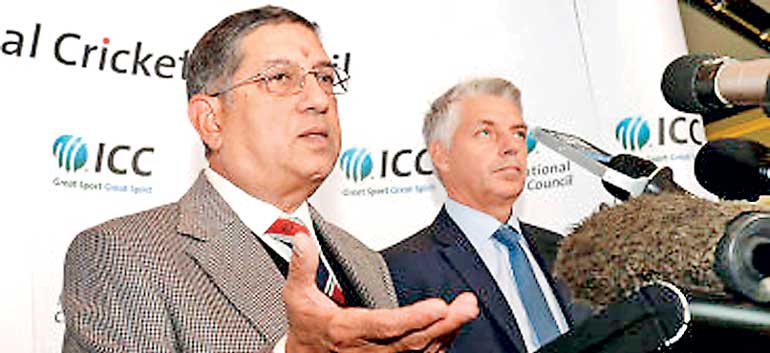Thursday Feb 19, 2026
Thursday Feb 19, 2026
Wednesday, 1 July 2015 00:00 - - {{hitsCtrl.values.hits}}

ESPNCricinfo: ICC Chairman N. Srinivasan believes there will be great difficulty in setting up and sustaining rebel cricket leagues despite the amount of money they might offer players.
His statement comes on the back of the Essel Group, who were behind the Indian Cricket League in 2007, outlining the possibility of another rebel tournament in May. Reports said they had approached players like David Warner and Australia captain Michael Clarke with hefty contracts.But Srinivasan said the current system is prevalent in too many places and has existed for too long to be shaken.
“Any attempt to form such a rebel league is not easy to succeed,” he told the Hindu. “Cricket as we know has been established over a long period of time in various countries. It is based on domestic structures that have been put in place for centuries as in the case of England and Australia, and 80 to 90 years in India.”“Just because ICC events are popular and receive broadcasting rights, it doesn’t mean it can be duplicated overnight. The assumption that a substantial chunk of players will go away and be part of a league that will sustain itself over time … it is hard to see that happening.”
The seriousness of the issue though cannot be brushed aside: “This is a company that’s coming in and trying to take over world cricket,” Warner had said, offering a player’s perspective. “At the end of the day if this company comes in and wipes out who you play for and you want to play cricket, what happens there? Who pays you? That’s the thing.”With the threat of a possible takeover of world cricket, the ICC had appointed a committee comprising Srinivasan, Cricket Australia chairman Wally Edwards and ICC finance and commercial chairman Giles Clarke to investigate the matter.
The same men had been at the forefront of a shake-up themselves when the Big Three position paper was pushed through at the ICC, giving CA, the ECB and BCCI greater decision-making powers. That had been met with a good deal of critique as well, but Srinivasan maintained his defence, listing an increase in financial benefits and a shot at Test cricket for Associate countries.
“The criticism is unfair. One looks at the financial model, the distribution is fair as far as the BCCI is concerned. They used to get a far lower share than what the region contributed. During this cycle, all Full Members will get more than in the previous cycle. Associates and Affiliates will get more, the glass ceiling is broken. The top associate will get an opportunity to play Test cricket. And there will be more opportunity for them to participate in ICC World Cup and Twenty20 events.”
Another point of contention that has followed Srinivasan and the BCCI has been their stance on DRS. Srinivasan, although no longer BCCI president, was happy with the continued opposition to it.
“When I was president, BCCI, for several valid reasons, did not agree to the use of DRS. The system includes ball-tracking technology as well as hot spot, snicko, etc. I am glad that the present BCCI management is doing the same.”